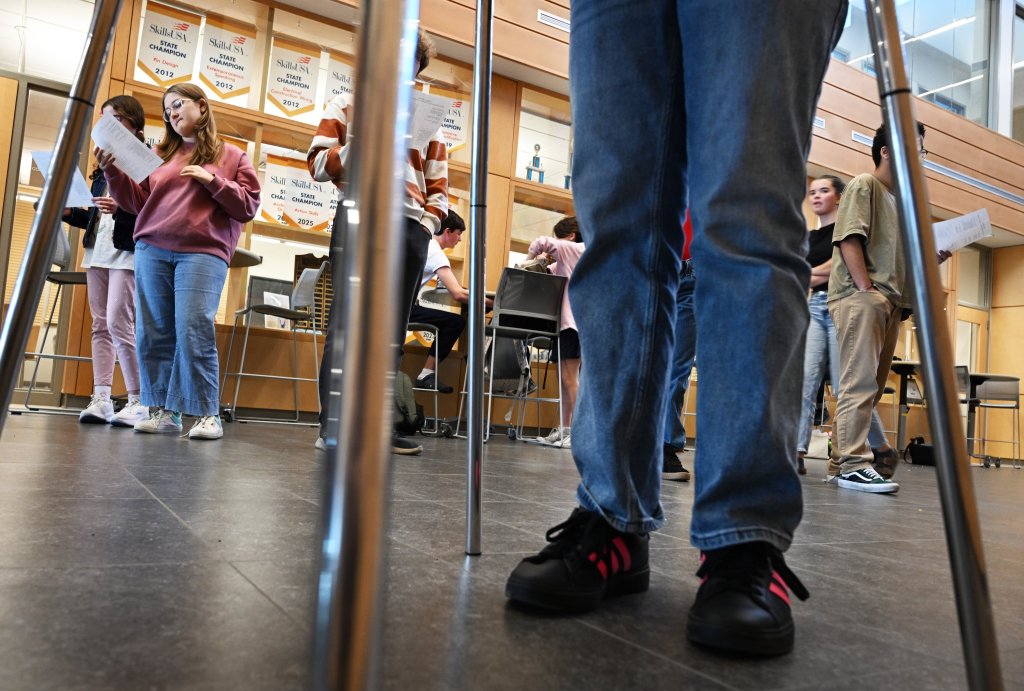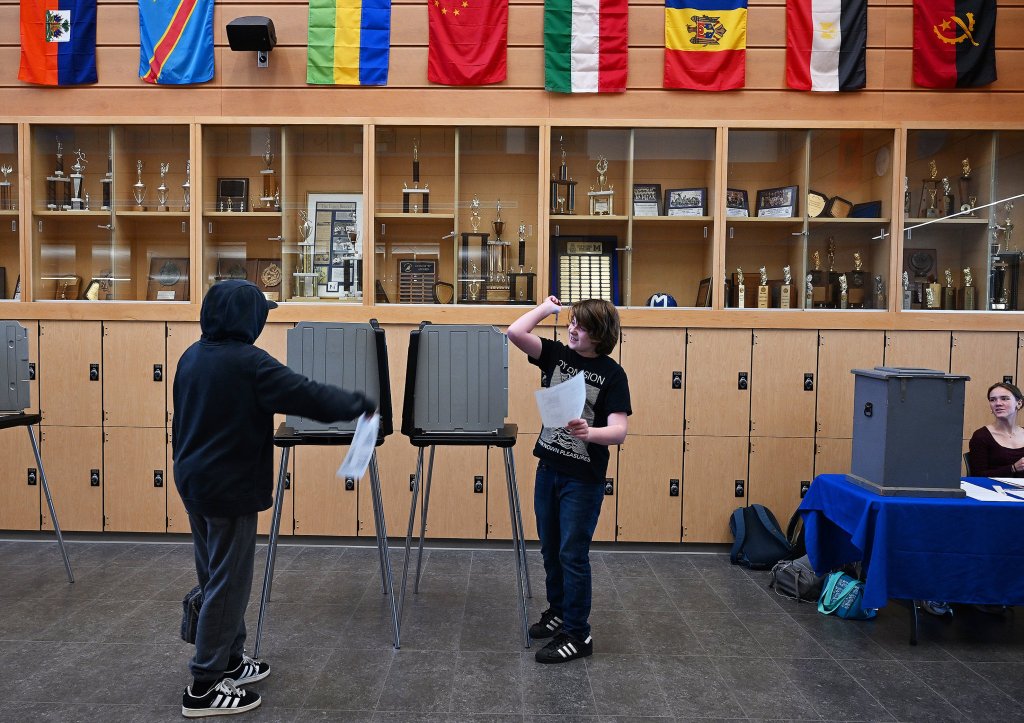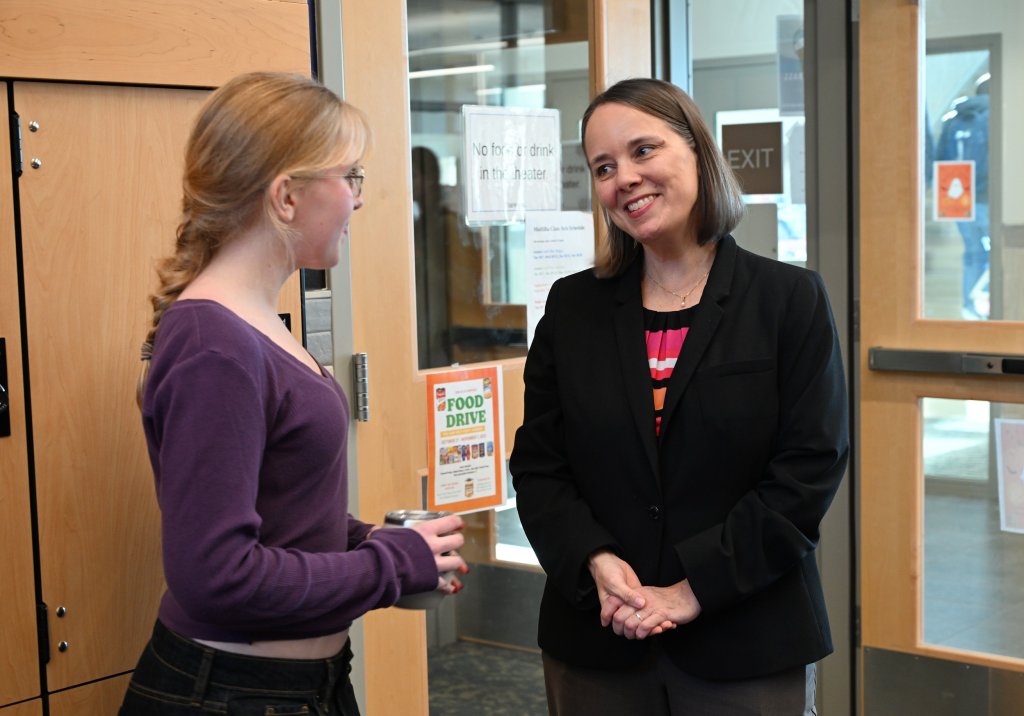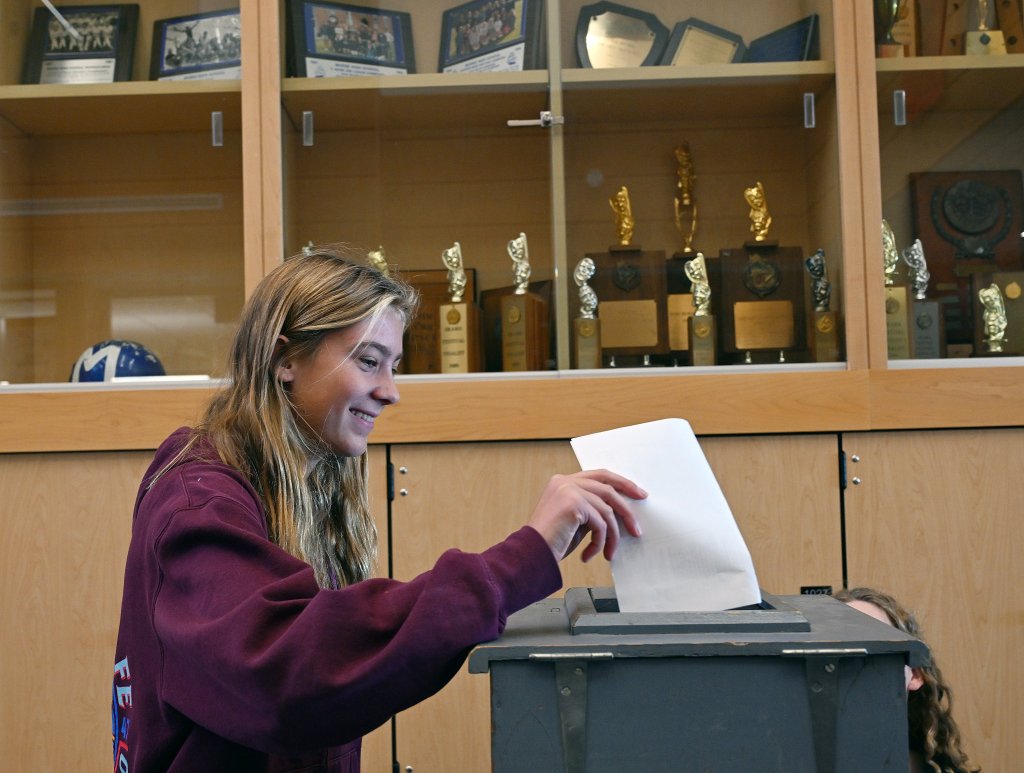
BATH — As Maine voters prepare to decide the fate of two statewide citizen ballot initiatives, students at dozens of schools tackled the same questions in mock elections Tuesday.
At Morse High School, some students were learning about the questions for the first time when they arrived at the polls. Others had seen the “Yes on 1″ and ” No on 1″ campaign signs scattered across lawns and roadsides.
Many said they were familiar with Question 2, which asks voters if they would like to create a “red flag” law that would make it easier to confiscate firearms from a person in crisis by allowing family members, in addition to law enforcement, the ability to petition a judge for a temporary removal order.
“I think (the second question) is just a little bit on everyone’s minds,” said 10th grader Logan Corey.
Students were less knowledgeable about Question 1, which would require voters to show photo ID to cast a ballot and make changes to absentee voting. Some said it’s just not a huge concern for people like them who can’t even vote yet.
Freshman Tim Brosnihan, though, said his grandmother is almost 90 years old and doesn’t have a driver’s license. He wants voting to be accessible for her, and other elderly people, which is why he voted no on 1.

This is the first year that students have gotten to vote in a mock referendum election, run by the Maine Department of the Secretary of State. Each of the 78 participating schools could use a ballot with the two real questions, plus a third question created for the mock election that asks students if they believe the Declaration of Independence is still relevant today.
Schools also could choose a ballot with just the third question, which was created for younger students to align with the 250th anniversary of the document on July 4, 2026. Officials said many elementary and middle schools still chose to use the real ballot questions, even though they include heavy topics.
“We know that when students practice voting, they are more likely to vote,” said Secretary of State Bellows, who made a stop at Morse and a few other schools that are holding mock elections. “Which is something that’s really important, because certainly the future of our state and our nation lies with our young people.”
Bellows, who is running for governor as a Democrat, cited Maine’s recent historically high voter turnout, especially among young voters ages 18 to 24.

Morse serves students in Regional School Unit 1, which includes Bath, West Bath, Phippsburg and Woolwich. About a third of the student body, 189 students, cast a ballot Tuesday.
Recent polling shows the votes on both questions will likely be close. At Morse, students voted ‘no’ on Question 1 and ‘yes’ on Question 2.
The full statewide mock results are expected Wednesday morning.
Maine students have proven highly predictive in mock elections — they have voted for the successful presidential candidate in every election since 2008, including last year’s. However, in the 2020 U.S. Senate race, students voted for democratic challenger Sara Gideon over Republican Susan Collins, who ultimately won her fifth term.
At Morse, voting picked up Tuesday morning when students headed to lunch. They stepped up to the table to provide their name to a poll worker, who crossed it off a list, then filled out their ballots at real voting booths provided by the city of Bath. When finished, they could grab an “I Voted” sticker.
Junior Willow Halpin is the president of Interact Club, which coordinates the mock election at Morse and provides the student poll workers. She said engagement in this referendum vote is nothing like last year’s mock presidential election, when students formed lines to cast their ballots. She said her peers definitely have less solidified opinions on the questions.
“One of the upperclassmen did come up to the table, and as he was voting he came back and was like ‘Oh, I saw one of the signs saying ‘No on 1’ so should I say no or yes?”‘ Halpin said. “And I was like, ‘I think you should read it.'”

Interact Club provided students with resources from the state that include simplified explanations of the ballot questions. They also shared a podcast called Pine State Politics, created by Morse alumna and current Bowdoin College student Natalie Emmerson.
For many students, voting in this mock election was just about practicing, and getting to share their voice.
“I’m just excited to see how it will actually be when I’m able to vote,” said junior Laura Kelley.

We invite you to add your comments. We encourage a thoughtful exchange of ideas and information on this website. By joining the conversation, you are agreeing to our commenting policy and terms of use. More information is found on our FAQs. You can modify your screen name here.
Comments are managed by our staff during regular business hours Monday through Friday as well as limited hours on Saturday and Sunday. Comments held for moderation outside of those hours may take longer to approve.
Join the Conversation
Please sign into your CentralMaine.com account to participate in conversations below. If you do not have an account, you can register or subscribe. Questions? Please see our FAQs.